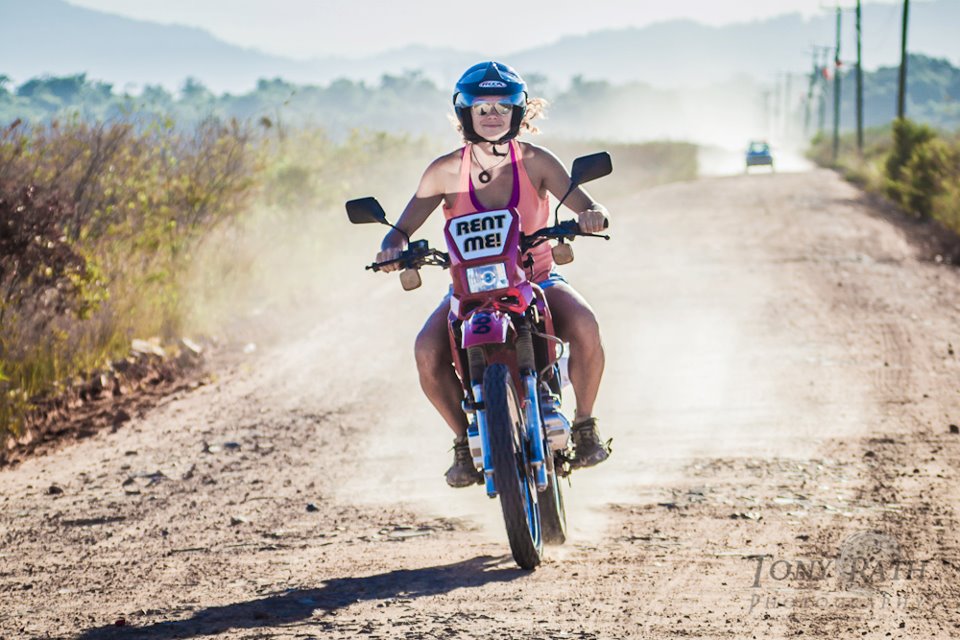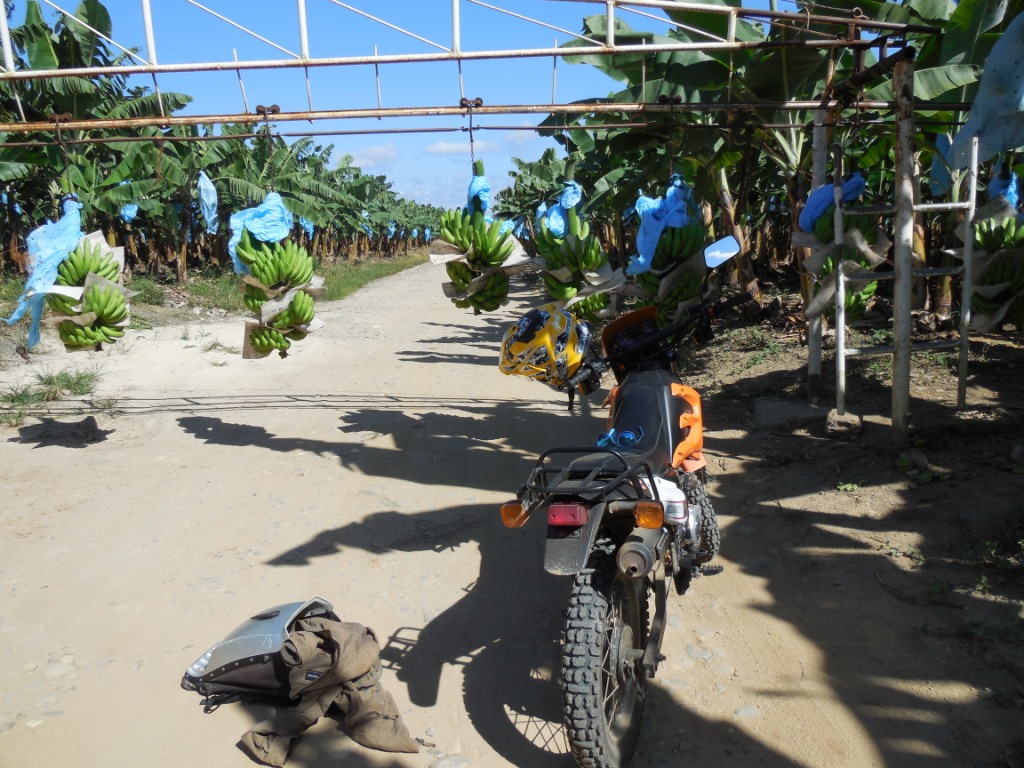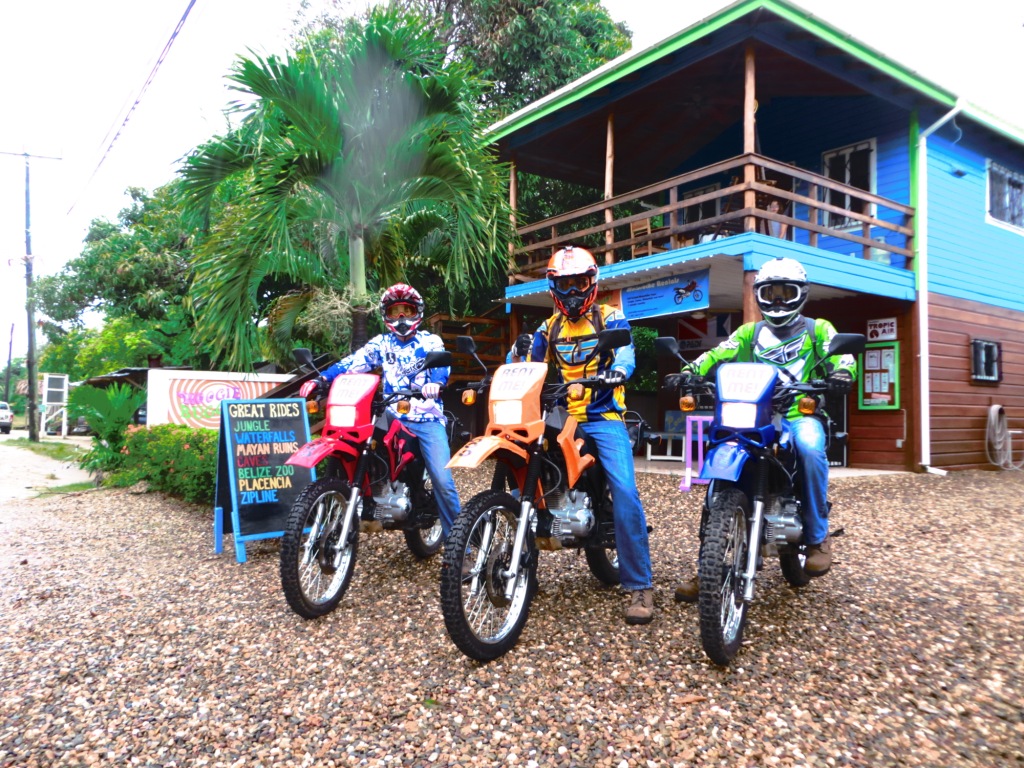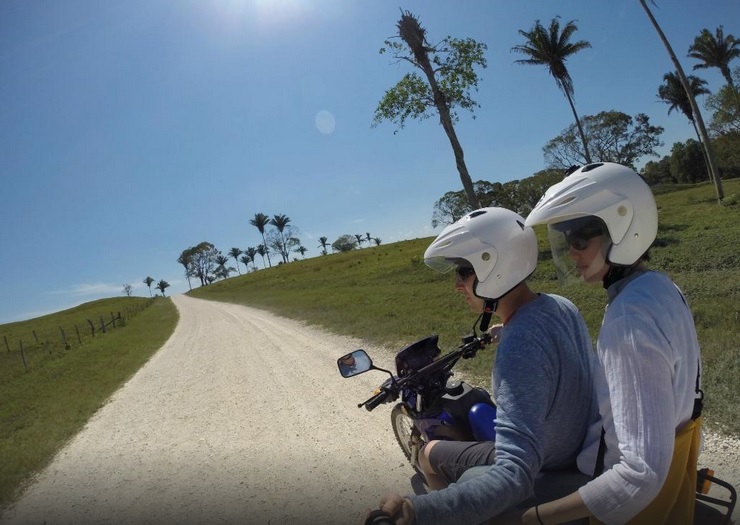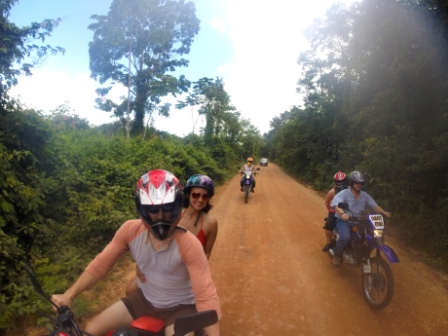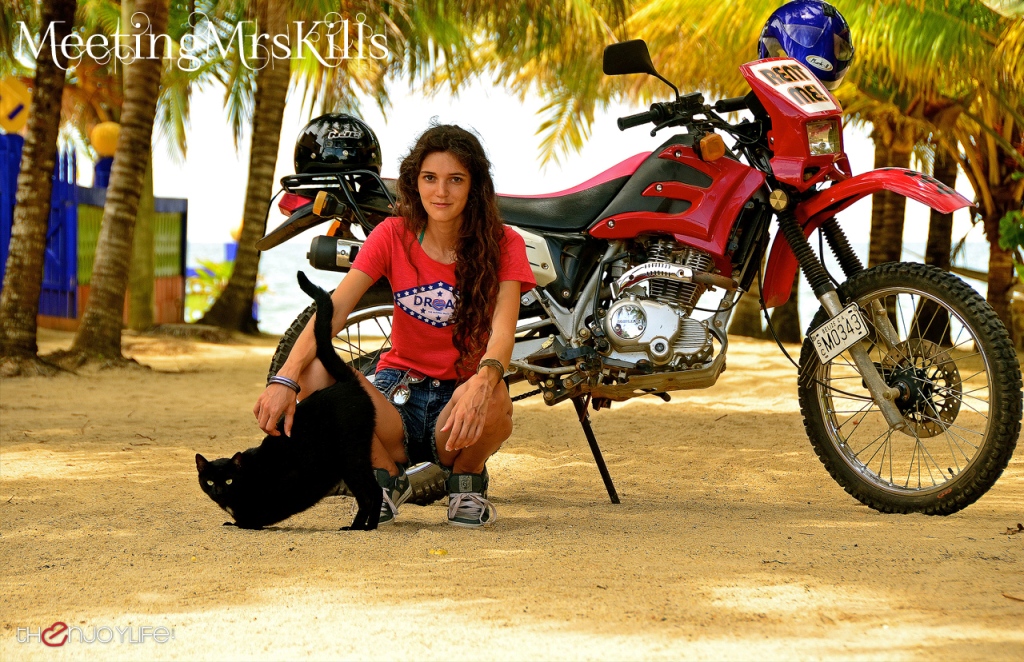Emma Cases of Alternate Adventures
/Lined with grit and adventure, Emma Cases has spent years building the only existing motorcycle touring and rental company in Belize. Motorbike Rentals & Alternate Adventures is a company founded on the idea of free-spirited growth and speculation of the world around us. Customers are equipped with not only a motorbike, but also helmets, technology, maps, and an abundance of information to guide them through the beautiful country.
Tune in to Emma's interview as she tells us how the idea sparked, and shares golden nuggets of advice on how to live out your own adventure!
1. Can you give us more of a look into your own personal motorcycle journey? (How did you get started riding, what do you ride, how long have you been riding, etc.)
I have been a rider for about 8 years. I have quite a comical story about how I became a rider. It all started with being afraid of motorcycles. For a person who consider herself relatively fearless, it is interesting to identify a fear and go through the process of facing it. Two things I have learned from this. First, we tend to be afraid of what is unfamiliar to us. Secondly, fears are contagious and often intentionally or unintentionally imposed on us. I was raised in a very loving and liberal family. I was encouraged to try pretty much anything that seemed instructive, eye-opening and/or challenging. That extended itself to explore different sports, education, friendships, countries and cultures but the encouragement took an abrupt stop when it came to power sports. My parents had absolutely no inclination towards engines and as far as they knew, motorcycles were nothing but dangerous and would most likely get you killed. This was their fear, that probably was grounded in what they had observed in life, and as contagious as fears are, it was passed on to me.
Now, one would have to understand that I am Swedish, and Scandinavians are generally speaking not really motor heads. Our riding season is very short and we can easily live our everyday lives (and tons of us do) without owning any type vehicle. The cities are very well set-up for public transport and we use our feet and love our bicycles. All this is to say that for these different reasons, I never really encountered motorcycles in my early life.
So, my first real chance to a close and personal experience with two wheels was while being in Belize. I was drifting through Central America on a backpacking journey and had seemed to get stuck in Belize. A camping trip in the jungle was offered to me and the way to get there was on the back of a motorbike. The love for adventure tickled stronger than the distress for two wheels with an engine. After two days on the back of the bike it was clear to me. I was done with riding bitch. I wanted to be the bitch in the front handling the powerpack. Fear had turned to a deep admiration for a complete new way of traveling that allowed you to be in the nature experiencing it fully while being parts of its winds, lights and smells.
My rental fleet consists currently of 15 bikes of 6 different models all ranging between 150-250cc. They are almost exclusively dualsport bikes. In addition to that I have a couple of bikes in parts (and for parts) as well as a little Suziki DR200 which I call my pack horse (it has a kick ass luggage rack and pelican boxes) which I use for a side business were I have to transport my merchandise to remote locations. The vast majority of my time, I however ride my fleet. I constantly rotate the bikes I ride and by doing that, I keep up to date on how my fleet is preforming.
2. How did Alternate Adventures come into fruition? Why did you choose to open it in Belize? Why not Sweden?
Alternate Adventures, which really in is complete name is “Motorbike Rentals & Alternate Adventures” (MR&AA) came about as a result of the discovery of the amazing experience of traveling on two wheels in this beautiful tropical country. Very quickly my life became about bikes. I rode them, cleaned them and learned how to maintained them. Also, I did some research and it turned out that nobody in Belize was renting bikes so I decided to take the leap and try this out. I got two 200cc dual sport bikes, registered a company and got myself a work permit. I acquired some tools and taught myself how to program HTML for my website and that was it. The first couple of years before MR&AA was established enough to pay me a salary, I had a bunch of side businesses to support myself. On the side I managed guest houses, had a laundry service and set-up a little breakfast business. MR&AA, was as you may gather by now, not something premeditated or well planned in any way. It was an opportunity to try something and instead of spending much time analyzing if this was indeed a good idea or not, I just did it. I have learned that thinking too much about stuff makes you sometimes get stuck in “analysis paralysis”. Once you try to have everything in place before you start or pre-plan how to solve every imaginary problem that you might encounter, you then tend to end up not trying it. If you solemnly accept that things will resolve themselves one way or the other, it will allow you to launch yourself into stuff, then you will just roll with the punches. Generally if you work at it, it will somehow work out.
3. What were you doing before owning Alternate Adventures?
I had spent my adulthood getting a college education (free in Sweden), backpacking the world (little savings get far in developing if you are willing to trade-off comfort) and working abroad (Chile) and Sweden. The last job I had in was a Supply Chain Analyst for a midsized Swedish consumer good company. The job was to identify problems and initiate solutions to any interruptions in the supply chain for 2500 items globally. In other words, computer screens and numbers. I quit this job when company politics showed me that I had reached a glass roof and would not get further ahead. I then packed my backpack and headed to Cost Rica for some surf. On that same journey, I eventually ended up in Belize.
4. What have been some of your best and worst memories with Alternate Adventures?
Every day new great memories take shape. I get to ride vicariously through my customers every day. They come back with small stories of places they discovered and people they have encountered, foods they have tried and animals they have seen. It is fabulous. Also, they tell me about the places they are from and about great rides where they live. This allows me to travel vicariously around this planet every day. My list of places I want to see and ride in gets longer and longer by the minute.
My worst memory was to end up having to face the bizarre situation of having an outlandish (non-Belizean) landlord breaking our rental agreement and put me on the street in the middle of high season for no other reason than envy of my success. This was followed by what felt like an entire village helping with dismantling my entire business (had at the time approximately a dozen motorbikes, a connected workshop with tons of tools and office) and setting it up at another location within a day! I wish I had recorded a time-laps of the dismantle and parallel reassembly at the other location – it was a wicked beautifully co-ordinated event aided by about 40 people! In hard times you discover who your friends are. The amazing support I received on this day of Exodus still moves me deep within. I now own the place I operate MR&AA from and have learned a valuable lesson of the essence to strive for independence at all times.
5. What do you provide customers with to make their alternate adventure even more incredible than the normal ride through Belize?
I try to find the particular interests and inclinations of each and every one of my customers and use my local expertise to help them design the ride that suits them. It is partly about the ride, but also a lot about the stops on the way. “What would these folks like to experience?” is the question that is brewing in the back of my mind as soon as somebody reaches the door step of my shop. The absolutely most fun people to work with are the ones that want to go as far off the beaten track as possible and that invite new unforeseen things to happen. These are the ones that truly create their own Alternate Adventure.
6. What are some of the best riding routes in Belize? What are some of the most challenging rides? Most scenic?
The most scenic paved route in Belize is the Hummingbird Highway. It cuts through the Maya Mountain range and its surrounding hills are curtained by jungle. It offers adventures on the way like waterfalls, sinkholes and caves. Belize is however mostly about dirt roads, back roads into villages, farmlands and Mayan Ruin sites. It is about finding new places and exploring the unconventional. It is in essence limited only by your imagination (and sometimes rivers that hopefully are not too deep to cross 😉 )
The challenge of a ride depends greatly on how the weather affects the road conditions. Great amounts of rain on certain soils can rapidly turn the roads into snot. For instance, getting trapped in rain on the Chiquabul forest on the way to Caracol Mayan Ruins can become an interesting experience. While I am very much for my customers’ own explorations, safety is always first. I spend a significant amount of time informing my customers about what to expect and how to make decisions based upon weather and time of day (I advise against night-time riding). I see MR&AA as an enabler and support pillar for my customers to create their own Alternate Adventures, but also to be able to handle their own adventurous creations at all times.
7. You have mentioned that Belize is a macho society. As we are based in the United States, we are often curious as to how other cultures’ gender roles are expressed. What could you tell us about the way of life for a woman in Belize?
Belize is a country of just over 300,000 people and a tremendous amount of different (ethnic) groups of people. The population constitutes of Creoles, Mayans, Garifuna, Mennonites, Chinese, Coolies, Lebanese and Spanish (these are the labels used here in Belize which are not necessarily correct descriptions nor understandable labels outside the borders of this country) living all together. Ethnicity, language, education and location are dividing lines among these groups of people. But plenty of things unite people too, one of them being to be proudly Belizean and another being the love for rice & beans!
Another thing that seem to cross over the ethnic dividers is the arrangement of families. Families are often large and they constitute of many children that not necessarily have the same father. The father sticks far from always around, while traditionally the mother stays at home, caring for the children to the best of her abilities. The role of the man is more free. He is not seldom a wanderer. However, a man in Belize with no children is not considered “a real man” just as a woman in Belize without children is not really a fulfilled woman. The achievement for the man seems to lie more in the production of children, not necessarily in the caring aspect of them. The women’s femininity may be gauged in her ability to attract a man who will contribute to family finances. Therefore, in my view, women put plenty of effort into appearances, hairdos and pedicures. From my northern European perspective, I have a hard time grasping how one could spend hard earned savings on a hairdos when the same amount of money may get you for instance a driver’s license. This description is of course overly simplified to be able convey this complex topic of gender roles. In addition, it is of course gradually changing over the course of generations. I hope that you follow that I am attempting to convey that while female independence is on the rise, it is still quite unusual to see a female business owners. Businesses indeed owned by women are generally speaking food related or other domestic services.
8. How do these gender roles affect women who want to ride/already ride motorcycles?
As an effect of a growing economy, motorcycles in Belize are rapidly becoming more popular. Motorcycles are often the first mode of motorized transport that a person or family can afford. Women are slowly catching on to this trend but seem to favor automatic scooters rather than gear shifted motorcycles and they seem to be more prone to ride passenger than owning or driving themselves. I am yet to see a woman (except myself of course) giving a man a ride!
Slowly but surely this is changing. In my company, I also sell parts and do mechanics for locals. Since very recently I have noticed a trend that women themselves coming to buy parts (as opposed to send their men for parts) for their scooters. It is mostly inner tubes, spark plugs and tires they buy and needless to say that I am very much looking forward to the day when they come and buy rings or intake valves on their own. Naturally they don’t fix their punctures themselves but daring to buy the parts is however a first step.
On another related note, the last ad I put out for an open apprentice position in my workshop I explicitly encouraged females to apply. None did, but I did get many comments from people that had noted my attempt to encourage the female segment of the population to apply. Despite the non-successful outcome, it did feel like it was my own (perhaps provocative) contribution towards breaking up imaginary limits of gender roles. I will keep tying 😉
In a wider perspective, I think there is a global trend in increased female riders. Over the years, my foreign customer demographic is changing and I have increasingly more female customers for the rentals and motorcycle adventures.
9. What challenges have you faced in attempting to operate a business in a foreign country as a female?
There are tons of challenges to open a business in a foreign country. Perhaps even more so in a country that is significantly less developed. Problem solving takes completely new shapes and forms in places like this. One might be better off to never have learned how to solve a problem before, it would save the effort of trying to “unlearn” what one already knows before having to relearn what one needs to learn. I dare to say, if not every day, at least a couple of times a week I learn something new here. After almost 7 years in business, it is still very instructive.
Personally I think I have been terribly fortunate and have not really seen any direct disadvantage of being a female running the countries probably number 1 motorcycle show. I dare to say even the contrary is true, it is so out of norm that a woman not only ride bikes, but also rents them, fixes them and helps other to fix theirs that I think the word spread quicker than it usually would. I have always felt I have been treated with respect here, but I have also worked tremendously hard (and for the first years with no employees) and people have witnessed this. I guess this combo of really trying hard combined with actually pulling it off, has put me in a position of respect.
10. What is a typical day in the life of Emma like?
I get up usually around 6 in the morning. I rent a great house on the beach and it is very peaceful. I never set an alarm, the birds outside my window and the light wake me up. For about one hour I zombie around the house with a magazine, computer or similar and a mandatory cup of coffee. I love to wake up slowly. Around 7 am I jump on my bike (I rotate the bikes I ride – this give me chance to keep up to date with the health status of my fleet) and do a short 5 min commute to work. By the time I reach my location, my assistant manager is already opening up the shop. We take a minute and discuss the main game plan for the day. Which bikes have come back, what maintenance steps to do but also what we need to build to make our garage more functional, ect. My 3rd employee shows up and starts cleaning bikes and doing the everyday basic maintenance of bikes and facilities. At 8 am I open our front doors (that we have made ourselves with old chains and sprockets - they are wicked!) People start to drop in wanting to go on self-guided motorcycle adventure tours, buy parts, get their bikes maintained etc. We methodically work through the crowds. By noon we usually have encountered some type of problem that needs to be solved. For instance, we have sold our stock of mirrors and can’t find any in Belize and need to find somebody who is going to Guatemala to pick some up. Or internet is down and we need to get the technicians to fix it. Or a leak in the roof has appeared because a coconut fell on it. Or, well, you get the hang of it. There is always something to deal with. In the afternoons, we work on a bigger building project, bike tweak or webpage improvement. Around 4.30 pm our bikes start to drop back for the day. I close at 5.00 am and then go for a short spin, yoga, swim or bar depending on the mood. It gets dark around 6.00 – I make or get some dinner and go to bed early.
11. What lessons have you learned that you'd like to share with women inspired to move abroad and live independently?
Do it. It is really not that big of a deal. Anybody with the right mindset can do it. But be patient. It takes time to find you place and role. The journey is instructive so you don’t want to rush it anyway. Make yourself a favor and accept that things will be different – not the same. Leave your home at home, don’t try create the same as at home, that will be like swimming against the current. If you move to a less developed country, prepare yourself to be even more patient. Try to not get frustrated when things don’t go your way, if you let yourself get frustrated you will waste your energy. You will need this energy to get ahead. It is an amazing adventure and try to approach differences with a curious and not judging attitude. If you despite all finally figure out it is not for you, you can return home with being one experience richer.
12. What about motorcycles/moto-adventuring inspires you?
It is just the best way to travel. It can get you places cars can’t, often faster and cheaper. Also, on a motorbike you tend to stop more often than in a car. This brings you to see more and meet more people. Needless to talk about the whole riding experience by itself, I mean, who do we need to convince? The freedom feeling. The nature experience. The speed. The power. The adrenaline. All of that.
13. What is your next milestone? Where do you see yourself in 5-10 years?
I have never operated quite like that. Opportunities just tend to fall in my lap and then I find it is mostly about having the ability to recognize it, and the courage to run with it. Not sure where I am heading but I am sure it will be great and adventurous!
When I opened my business 7 years ago, my goal was to be able to take a total of 3 months off each year. Last year I managed this for the first time. Of course, MR&AA is open 7 days a week and I work 7 days a week large parts of the year, so those 3 months essentially make up the weekends I don’t usually get. Since last year, I have a great team in place and I managed to take 3 months off in total and managed to spend time in the US, Europe and Northern Africa. My next trip will be snowboarding in the mountains of Colorado and later this spring I would like to bike southern Utah. In between I am also lined up to climb Belize’s highest peak, a 3 day endeavor including Hennesey hammocks, machetes (to sleep and cut through the jungle) and climbing gear. All of that is very exciting to me.
Find more information about Alternate Adventures and plan your ride in Belize with Emma at the website, Facebook, or Instagram!

